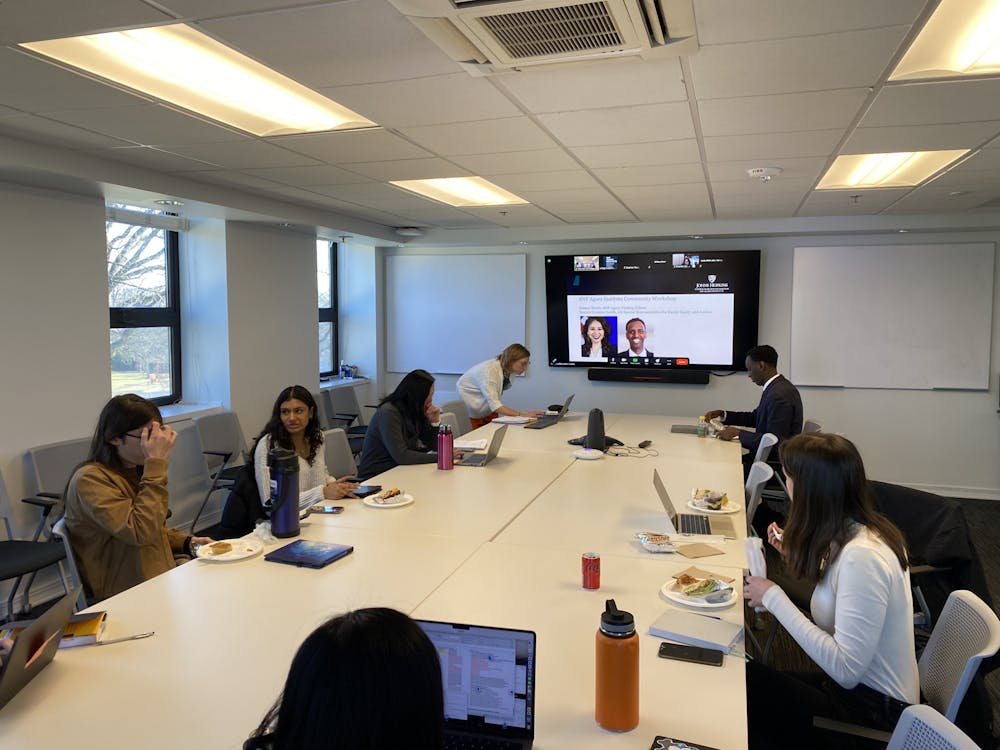The SNF Agora Institute held a community workshop titled “Promoting Inclusive Democracy Amidst Global and Local Challenges” on Feb. 6. The event featured Desirée Cormier Smith, the first Special Representative for Racial Equity and Justice for the U.S. Department of State, and Hamse Warfa, a SNF Agora Visiting Fellow and Senior Advisor to the U.S. Department of State. Both speakers were appointed in 2022 and continue to work in the Biden administration.
In an interview with The News-Letter, freshman Michael Newbold, studying International Studies and History, shared that he attended the event to hear the speakers’ perspectives on the influence of American policy on a global level.
“I was curious to see how U.S. foreign policy and engagement in the United States government works from an ethnic involvement perspective,” he said.
The event began with a brief introduction about the topic of discussion by Warfa, who briefly spoke about his background as a first generation Somalian immigrant. He then introduced Smith, who shared that her family is originally from Louisiana but that her grandparents moved to California along with other Black Americans in the 1940s to escape segregation.
“My grandfather became the first Black student to enter his high school [in Los Angeles], and that became a very pivotal experience for him and really shaped his worldview and his passion to never have any other child be subjected to that inhumane treatment,” she said.
Smith stated that she was greatly influenced by her grandfather’s deep commitment to equity and justice since childhood. However, their views on the scope of the issue was slightly different; her grandfather focused on the racial inequities at home, while Smith saw human rights and racial rights problems across borders as interconnected.
“I saw what was happening in South Africa during apartheid impacted Black people in the United States. I saw the plight of Black people in Brazil as connected to the plight of Black Americans,” she noted. “I very much believe in the connection of the black diaspora but also that injustice anywhere is a threat to justice everywhere.”
Adhering to this view, Smith commented that while she pursued a career in foreign policy and law, she stayed connected to the issues of injustice in the United States.
The position of Special Representative for Racial Equity and Justice is one that was newly made by the U.S. Department of State in 2022, and Smith is the first person to take on the role. Smith voiced that she sees the position as having two main mandates: ensuring that U.S. foreign policy programs serve to protect the human rights of marginalized racial, ethnic and indigenous communities and that global partnerships combat structural racism, xenophobia, and discrimination.
Smith stressed that while she aims to pursue these foreign policy goals, she is very much aware that these same challenges have not yet been solved in the United States.
“Our mandate was to recognize these challenges as global, as challenges that do not start and end in our borders and as challenges that require coordinated and sustained global solutions if we're ever actually going to address these,” she said.
A Q&A session followed her talk. One student asked about her position as a woman of color in academia, and whether she feels that she carries a burden due to her background. Smith responded that her focus on foreign policy is also a way to give voices to marginalized communities.
“I recognize, because of my background in foreign policy, that there are Black and indigenous people all over the world that need support and that need recognition,” she said. “It is important that experts do not ignore the racial inequities that are present throughout the world. Oftentimes U.S. foreign policy, inadvertently or not, can contribute to those inequities. So that's why our model focuses on US foreign policy and marginalization on the world stage.”
Smith answered several other questions about her personal background and her role in the Department of State before the event concluded with a final thanks.
Senior Dominic Solís, majoring in International Studies, expressed his interest in hearing Smith’s unique perspective in an interview with The News-Letter.
“It's always a great experience to see different perspectives,” he said. “It was great to be able to see a part of the government that I haven't yet seen before through an interesting story about how it operates. It's imperative to understand how these forms of government operate.”
Similarly, Newbold commented on the new perspective he gained from the event about United States foreign policy.
“One of the best ways to advance democracy is building a commitment to human rights for all ethnic groups through examinations of our past failures,” he said. “[We need] to see where we fall short, either internationally or domestically.”





